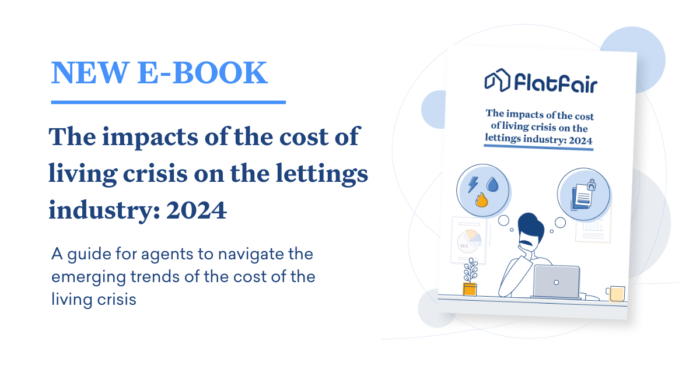Agents Apr 15, 2024 < 1 min read
E-BOOK: The impacts of the cost of living crisis on the lettings industry 2024
The escalating cost of living has rapidly and significantly impacted the UK lettings industry. Agents are working…

Over 11 million people in England are currently renting their homes, which means millions of pounds are tied up in deposits – but who do they really benefit? As 2019 fast approaches, it’s clear that the days of the traditional deposit are numbered, and here’s why…
1. Can anyone really afford them?
Let’s face it, tenancy deposits require huge chunks of money that most of us simply don’t have. According to research carried out earlier this year, the average London tenancy deposit stands at approximately £3,014 (even when capped at the equivalent of six weeks’ rent). That’s a lot of cash to come up with and then lock away, isn’t it? In fact, research by Which? found that two in five tenants (that’s 43%) who were planning to move to a new rental property had to use a credit card, loan or overdraft, or borrow cash from friends and family, to pay for a deposit on their new home, as well as moving costs. That’s hardly an ideal way to start life in a new home.
And, in case you haven’t already figured, that big chunk of money could be used to save for a deposit to buy a house, rather than secure the rental agreement on someone else’s home. It’s no wonder potential tenants find themselves stuck at home with mum and dad, alienated from the market. If only they could pay just a fraction of a deposit and move in faster, then pay for any claims when they decide to leave… Well, their wish is flatfair’s command.
2. We all hate playing the waiting game
Not only do renters have to cobble together a hefty deposit for their next place, they’re often still waiting to get the deposit back from their old one, too. According to Which?, one in six tenants who had moved out of a rental property in the past two years said it took more than four weeks to have their deposit returned, with a third having to pay a new deposit before they had received their previous one back.
At the same time, landlords often find themselves twiddling their thumbs, waiting for deposit funds they need to fund any claims and damages to be released by the parties who hold the deposit monies. With a six-week cap on how much they can claim, they can also find themselves in lengthy court disputes should they need to recover more – or even out of pocket if they choose to settle sooner.
With flatfair, there’s no such thing as hanging around. Tenants pay their membership fee, and then they’re charged for claims when they leave. They’re able to settle, negotiate or counter claims quickly and transparently online – and if landlords are still owed money? flatfair will put them in pocket and pursue payment from tenants themselves.
3. Admin, admin, admin…
Any agent will tell you that the time it takes to compile the correct paperwork for deposits, get the landlord to sign, get tenants to sign, receive payment, send off the documentation and receive confirmation that the tenancy can proceed can take several long, painful weeks. What a headache. With a system like flatfair, everything is uploaded and completed online, so it’s quick and it’s painless for everyone.
4. Empty properties are no good to anyone
As tenants take time to scrimp and save for upfront deposit fees, landlords can struggle to fill their properties as quickly as they’d like (and still have to keep up with rolling mortgage payments, of course). By charging tenants an affordable one-off membership fee, and onboarding tenants online, flatfair can help landlords reduce lengthy void periods and get tenants settled far sooner.
5. It’s no fun being left in the dark
Tenants and landlords not only have to wait at the end of each tenancy to find out when the deposit monies will be released, but tenants also may not know whether they’ve been charged a fair price for fair claims. Equally, landlords have no way of checking whether tenants have indeed paid for services, such as end of tenancy cleaning, already.
By logging on to the flatfair platform, tenants and landlords can both upload documents to prove the costs paid by either side. They also have access to a government authorised Independent Dispute Resolution service (whose judgement is final) should they want to use it.
6. Where are the rewards?
So, you’re a tenant who’s successfully ended your tenancy with no problems whatsoever, but what does that get you in the long run? Nothing, if you’ve paid a traditional deposit. You’ll simply be asked to fork out for another big deposit on your next home.
With flatfair however, tenants who have rented a property with care can enjoy a discount on their next tenancy, so they’ve got even more cash to spend on making their new place feel extra special.
7. And finally? They’re simply old-fashioned
We’ve all heard the saying, “if it ain’t broke, don’t fix it” – but the traditional deposit model is as broken as they come. In the past year, flatfair’s progressive approach has attracted thousands of agents, landlords and tenants across the UK and saved tenants millions in deposit costs. As flatfair’s Founder & CEO Franz Doerr explains, “Tenancy deposit alternatives have been around for years in Europe and it’s exciting to see that the UK is finally catching up. It’s only a matter of time before flatfair replaces the old deposit model. Bring on 2019.”
Want to sign up with flatfair? Find out more here.

The escalating cost of living has rapidly and significantly impacted the UK lettings industry. Agents are working…

Deposit alternatives are becoming increasingly popular – in part due to the cost of living crisis. Tenants…